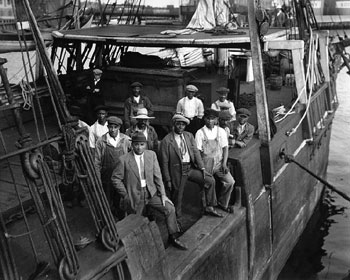Challenging Prejudice
Cape Verdeans, in particular, confounded prevailing notions about race. Herman Melville described these seamen as an "amalgamated generation" of Portuguese and West Africans who, once settled in American port towns, were "liable to be taken for naturalized citizens badly sunburnt." Census takers in Nantucket manifested confusion as to how to assign race to local Cape Verdeans. Someone initially categorized them as "B" for black only to have this designation crossed out and replaced by "W" for white.
There is significant historical research that suggests that whaling men challenged shore-based prejudice when they were at sea working alongside an international and racially mixed crew. There are fewer studies that explore how these whaling experiences continued to impact men's lives once they settled on land. At least some former whalers questioned shore-based institutions. Abolitionists were able to recruit many young, white seamen to their cause. Whaling communities that supplied mixed crews also tended to nurture anti-slavery leaders such as Frederick Douglass.

New Bedford Whaling Museum